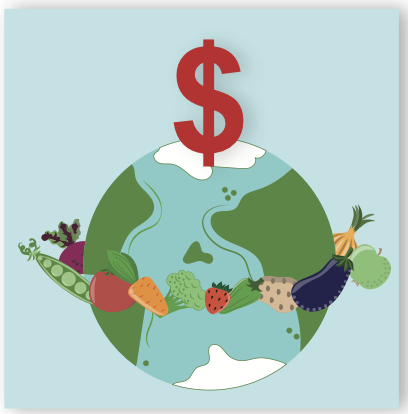FDA Approves New Artificial Sweetener
The US Food and Drug Administration has approved a new artificial sweetener, advantame. A derivative of another artificial sweetener, aspartame, advantame is a free-flowing, water soluble, white crystalline powder that is stable even at higher temperatures, and can be used as a tabletop sweetener as well as in cooking applications, according to the FDA.
Takeout Customers Try for Healthy Foods
Health-conscious takeout customers are going crazy for chia seeds, quinoa, almond milk and kale, according to the online ordering site GrubHub.
Its No Longer a Small World
More than 2 billion people around the world are now overweight or obese, according to a new University of Washington study in The Lancet. Since 1980, the global proportion of women who are overweight or obese has gone from 30% to 38%; men have gone from 29% to 40%, overtaking women in percentage overweight or obese.
Proposed Nutrition Labels Pay Off in Quick Viewing
The proposed new Nutrition Facts labels are more helpful, more accurately reflect serving sizes and better alert consumers to less-healthy foods-at least in the 10-second span the average grocery shopper spends looking at labels.
Eating Mini-Meals Alone Growing in Popularity
Sitting down to a home-cooked meal with the whole family is increasingly a thing of the past, according to a report from the trend-watching Hartman Group.
Consumers Like Organic, Even If Confused on Meaning
A new survey finds 84% of US consumers say they sometimes buy organic foods, and 45% buy organic at least once a month. But the survey of 1,016 adults, conducted by Opinion Research Corp. for Consumer Reports, also turned up some consumer confusion over what exactly that USDA organic certification means. Fewer than half, for example, knew that the organic seal on poultry or eggs means that the chickens went outdoors and had a certain minimum amount of living space. (Nearly two-thirds, however, thought organic should signify such requirements.) And 20% reported buying organic fish, even though the USDA has no such standard; nearly all (92%) said the agency should have guidelines for organic fish.
Foodborne Illness Rates Little Changed
Were not exactly winning the war on foodborne illnesses, but at least last year we battled to a draw. According to a new report from the Centers for Disease Control and Prevention (CDC), rates for illness and hospital admissions in 2013 were down marginally from 2012. Deaths were up slightly, based on laboratory-confirmed infections caused by nine pathogens at 10 US sampling sites. Looking at specific pathogens, salmonella cases were down but still accounted for the most infections; only campylobacter, mostly from poultry and raw milk, came close. The sharpest increase, though still a small percentage of total cases, came from vibrio, a bacterium found in raw shellfish such as oysters; warmer coastal waters may be to blame, CDC experts said.
Review: Menu Calorie Counts Not Enough
Even as larger restaurant chains are adding calorie labels to their menus, as required by the Affordable Care Act, a review of the evidence cautions that those numbers alone may not change consumer behavior. The review of 31 studies, published in the Journal of Community Health, concluded that the best-designed studies show that calorie labels do not have the desired effect in reducing total calories ordered. Women, dieters and upper-income diners paid the most attention to restaurant calorie numbers, but overall the impact was negligible. It may be the case that calorie labeling alone is not sufficient to modify consumer behavior in the desired direction, researchers wrote. Other presentation formats, including color coding, physical activity equivalents and healthy logos or traffic lights, might prove more successful, they added.
Mouthfeel Affects Calorie Assumptions
Its true of ice cream and rice cakes, but people tend to generalize such associations of mouthfeel and calories to all foods: Soft and creamy foods that melt in your mouth have more calories than foods that are crunchy and rough-or so we assume, according to a new study. Researchers reported the results of five laboratory studies in the Journal of Consumer Research, comparing, for example, how many calories subjects estimated were in hard versus soft brownies. Foods that were hard, crunchy or had a rough texture were generally rated as lower in calories than choices that were smooth and required less chewing. Surprisingly, participants overestimated calorie counts of all the foods, but guesses for soft and creamy foods were even further inflated.
Friedman School Names New Dean
Dariush Mozaffarian, MD, DrPH, has been appointed dean of Tufts Gerald J. and Dorothy R. Friedman School of Nutrition Science and Policy, the only graduate school of nutrition in the US. Dr. Mozaffarian has been an associate professor in the Department of Epidemiology at the Harvard School of Public Health, where he is co-founder and co-director of the Program in Cardiovascular Epidemiology. He is also an associate professor in the Division of Cardiovascular Medicine at Harvard Medical School and Brigham and Womens Hospital.


























